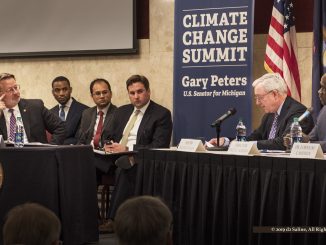
Congressional efforts to launch impeachment procedings against Donald Trump started well before he entered office as the 45th President of the United States. The 116th Congress convened earlier this year with key Democrats, including Michigan Representative Rashida Tlaib, promising to make this Constitutional step a priority. [1-7]
Last Tuesday, Speaker Nancy Pelosi announced “that the House would initiate a formal impeachment inquiry against President Trump ….” [8,9]
As if having accessed a crystal ball for timing, Washtenaw Community College (WCC) had set this topic for one of its longer ninety-minute offerings during their second of two “Free College Day” programs this year. [10,11]
Titled “Impeachment and Removal Do Not Fill a Vacancy — They Create a Vacancy,” subject matter was covered by University of Michigan Political Science lecturer Lynn Rivers. Equally important here, from her home in Ann Arbor, she served four elected terms as a party Democrat in the United States House of Representatives, from 1995 to 2003. [12,13]
As such, she was a part of history when impeachment procedings were initiated against William Jefferson Clinton. He was the third US President to face such an inquiry, only the second to be impeached. The first was Andrew Johnson, who has become President with assassination of Abraham Lincoln. [14-22]
Neither was removed from office.
Congresswoman Rivers framed her content with a quote from former President Gerald R Ford, attributed to his own time as a Congressman from Grand Rapids Michigan. [24]
An impeachable offense is whatever a majority of the House of Representatives considers it to be at a given moment in history.
Accepting this as given, Lynn Rivers proferred the notion that “impeachment is always on the table anytime you have a President of one party and a House held by the other.” The standard for Impeachment, then, is not just as low as had been suggested by former Congressman Ford, but deliberately so. In fact, Benjamin Franklin argued in favor of Impeachment as a necessary mechanism for removing a public official who had “rendered himself obnoxious.” [25,26]
Accordingly, she started out with a digression into the Twenty-Fifth Amendment as a Constitutional route discussed for removing President Trump from office. In a series of white board summaries subsequently erased almost as quickly as she’d written them, Congresswoman Rivers described the futility of such thinking. [27,28]
There’s no standard for determining a president’s fitness beyond the “committee” vote of individuals designated to say he’s not fit. So, they say he’s unfit, the next day, he says he’s fit — and back in office. There are no restrictions on how many times that can go back and forth.
She then turned to Article II, Section 4 of the United States Constition. [29]
The President, Vice President and all civil officers of the United States shall be removed from office on Impeachment for, and conviction of, treason, bribery, or other high crimes and misdemeanors.
This she laid out across two boards: One for the role of the United States House of Representatives, the other for the US Senate.
Giving a nod to the famous saying that any prosecutor worth his salt could get a grand jury to “indict a ham sandwhich,” she called this the proper parallel for the role of Congress and what may come of Speaker Pelosi’s Impeachment gambit. “Hundreds of Members of Congress have offered resolutions to Impeach a lot of Presidents; it’s incredibly common. [30,31]
But we can count on one hand the number that have actually gone forward and resulted in Impeachment. Fifty-percent plus one member voting in favor, and you’re Impeached.
Then it goes to the Senate. And that’s a more deliberative process — with the President getting his own lawyer and having him there to defend him. Witnesses are called. Senators are both in charge of that process and they vote. It takes two-thirds of the Senate plus one to remove and Impeached President.
And that has never happened.
It’s a high bar to remove an elected President, to overturn an election.
When people say ‘It’s a political process,’ you better believe it is. Because they’ve always got to be thinking, ‘If I do this to their guy, they could turn around and do it to my guy down the road.’ Voters don’t like it, either; they don’t like having their votes overturned in something that just seems ‘political.’ [32]
Impeachment is very easy legislatively, very difficult politically.
Having gone through this process as a sitting member of Congress when Articles of Impeachment were put up against President Bill Clinton, how does she feel about her own stand with his party at the time? “Based on what’s come out in the last ten to fifteen years, I feel less good about my vote.
This time isn’t going to be easy, either: Not for Congress or the people. New information could come out next week and this whole thing could go away.
References
- “How hard is it to impeach a president?” CBC News (June 8, 2017) YouTube.
- “How to impeach a president” Vox (March 10, 2017) YouTube.
- “Donald J Trump” The White House.
- “Democrats Are Paving the Way to Impeach Trump” Emily Jane Fox (December 15, 2016) Vanity Fair.
- “The campaign to impeach President Trump has begun” Matea Gold (January 20, 2017) The Washington Post.
- “New Democratic Congresswoman Rashida Tlaib on Trump: ‘We’re Going To Impeach The …’” Ian Schwartz (January 4, 2019) Real Clear Politics.
- “Congresswoman Rashida Tlaib, Representing the 13th District of Michigan” United States House of Representatives.
- “Congresswoman Nancy Pelosi, California’s 12th District” United States House of Representatives.
- “Nancy Pelosi Announces Formal Impeachment Inquiry of Trump” Nicholas Fandos (September 24, 2019) The New York Times.
- “Free College Day” (September 29, 2019) Washtenaw Community College.
- “Realistic in terms of look and body functioning, patient simulators are helping train nurses for ‘elite’ performance” Dell Deaton (April 8, 2019) Saline Journal.
- “Lynn N Rivers” LSA Political Science, University of Michigan.
- “Rivers, Lynn Nancy” History, Art & Archives, United States House of Representatives.
- “A Congressman’s ‘Toughest Vote’” Kevin Merida (October 9, 1998) The Washington Post.
- “Bill Clinton’s impeachment: How it happened” CNN (July 12, 2017) YouTube.
- “What impeachment looked like for Bill Clinton” (September 28, 2019) CNN.
- “William J Clinton” The White House.
- “Articles of Impeachment” Watergate.
- “The Impeachment of Andrew Johnson” PBS.
- “Andrew Johnson” The White House.
- “Abraham Lincoln” The White House.
- “Impeachment” United States Senate.
- “Gerald R Ford” The White House.
- “Impeachment” Khan Academy.
- “Benjamin Franklin” Biography.
- “Presidents Can Be Impeached Because Benjamin Franklin Thought It Was Better Than Assassination” Kat Eschner (December 19, 2016) Smithsonian.
- “25th Amendment: Presidential Disability and Succession” Constitution Center.
- “What is the 25th Amendment?” Megan Trimble (February 14, 2019) US News & World Report.
- “Article II: Executive Branch” Constitution Center.
- “How Does a Grand Jury Work?” FindLaw.
- “What is an Indictment?” FindLaw.
- “Impeach Trump? Lessons learned from Clinton’s impeachment, 20 years later” Susan Page (December 18, 2018) USA Today.



